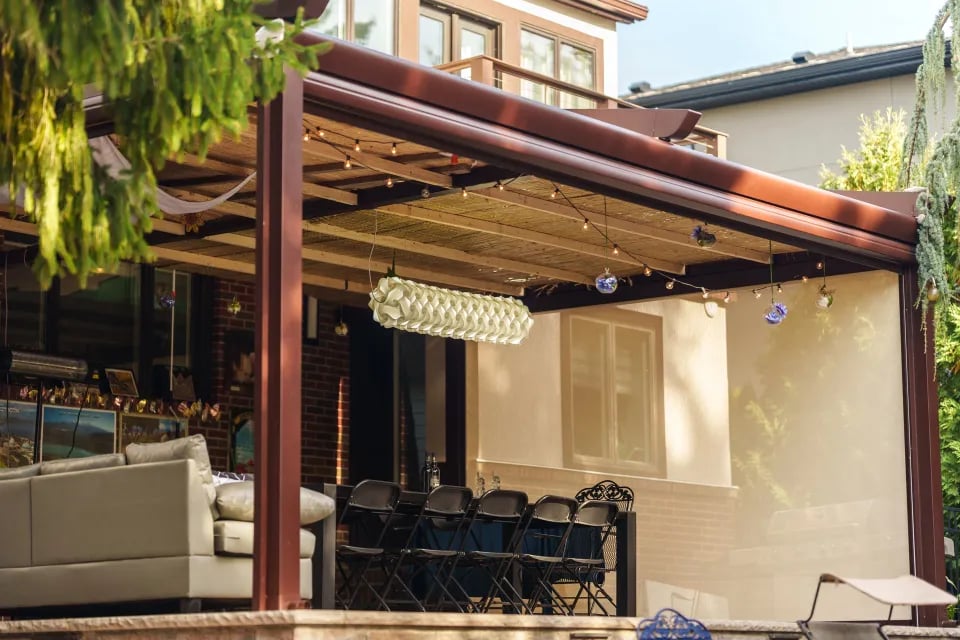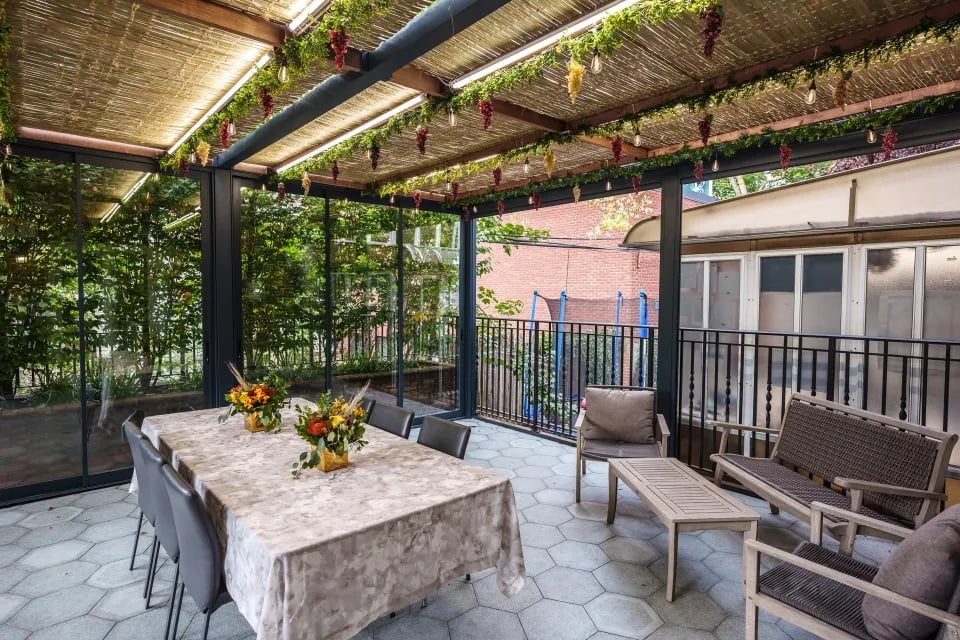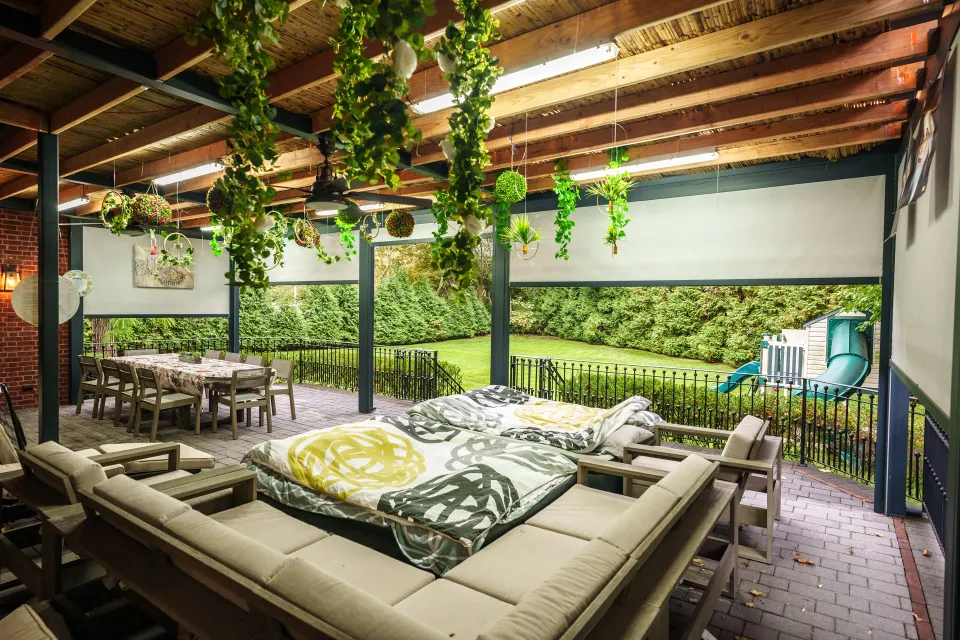Sukkah Design Inspiration: How to Use Your Pergola to Create the Ultimate Sukkah Experience
Sukkot, a Jewish festival known as the "Feast of Tabernacles" or "Feast of Booths," is a time of joy, reflection, and community. At its core, Sukkot celebrates the biblical journey of the Israelites through the desert, commemorating the temporary dwellings they used during this period. Central to this celebration is the Sukkah, a symbolic hut with profound cultural and religious significance. Sukkah design is not merely an aesthetic endeavor; it's an essential part of the Sukkot celebration. The way you design and decorate your Sukkah can profoundly impact the overall experience, transforming it into a space that is not only symbolic but also inviting and memorable. In this article, we will explore the importance of Sukkah design and how to use your pergola to create the ultimate Sukkah experience.
The Significance of Sukkah Design
Sukkah design goes beyond aesthetics; it holds a deep historical and cultural significance within the Jewish tradition. To truly appreciate the importance of this design, one must delve into its roots.
Historical Roots of Sukkah Design
Sukkot's origin can be traced back to the biblical era when the Israelites wandered through the desert for forty years. During this time, they dwelled in temporary huts, or Sukkot, which offered basic shelter and protection from the elements. The practice of constructing and dwelling in Sukkot during Sukkot continues to honor this historical journey.
Symbolism in Sukkah Design
- Shelter: It symbolizes the temporary, fragile nature of life and serves as a reminder of our dependence on God for protection and sustenance.
- Unity: The Sukkah provides a sense of community, as it is customary to invite family and friends to join in its construction and celebration.
- Harvest and Gratitude: Sukkot is also known as the Feast of Ingathering, marking the end of the harvest season. The Sukkah signifies gratitude for the bountiful harvest and the connection between nature and spirituality.
Understanding the historical roots and symbolism of Sukkah design lays the foundation for appreciating its significance in celebrating Sukkot. In the following sections, we will delve into how Sukkah design can be elevated using a pergola, opening up a world of creative possibilities to enhance this cherished tradition.
Sukkah Design Basics
Before diving into the creative possibilities of using a pergola to enhance your Sukkah, it's crucial to grasp the fundamental elements and guidelines that shape Sukkah design.
Essential Components of Sukkah Design
Sukkahs are traditionally simple, yet there are key components that form the foundation of their design:
- Walls: A Sukkah must have at least three walls, typically made from various materials like wood, canvas, or bamboo. These walls should be sturdy enough to withstand typical weather conditions.
- Roof: The roof, or "sechach," is usually made from organic materials like palm fronds or bamboo, allowing those inside to see the sky while providing shade and protection. It should be thick enough to offer more shade than sun.
Guidelines for Constructing a Sukkah
To adhere to the Jewish legal requirements, several guidelines need to be followed when constructing a Sukkah:
- Proportions: The Sukkah should be large enough to accommodate a table and chairs, yet small enough to retain the sense of a temporary dwelling.
- S'chach Requirements: The materials used for the roof (s'chach) should be plant-based and remain unprocessed. The s'chach must provide more shade than sunlight.
- Location: A Sukkah is typically constructed outdoors, under the open sky, to be a reminder of the Israelites' journey through the desert.
- Timeframe: The Sukkah is built before the festival begins and remains in use throughout the seven days of Sukkot.
Understanding these Sukkah design basics is essential as they lay the foundation for creating a Sukkah that adheres to tradition while also providing a canvas for creative design elements. When considering a pergola in your Sukkah design, it's crucial to ensure these foundational principles are upheld.
Using Your Pergola for Sukkah Design
Incorporating a pergola into your Sukkah design introduces a unique and innovative dimension to your Sukkot celebration. This addition merges the traditional significance of the Sukkah with the modern practicality and aesthetics provided by a pergola.

The concept involves using your existing pergola structure or erecting a temporary one for the Sukkot festival. There are several compelling benefits to doing so. Firstly, a pergola offers an excellent framework for your Sukkah, ensuring stability and structure. Unlike traditional Sukkahs that might require more intricate construction, the pergola provides a reliable base for the Sukkah's walls and roof.
Additionally, one of the key advantages of using a pergola is the provision of shade. During the Sukkot festival, it's customary to dine and spend time in the Sukkah. A pergola's overhead lattice or roof structure provides the necessary shade, shielding occupants from the sun's rays while still allowing a view of the sky, in line with Sukkot traditions.
Moreover, the aesthetic appeal of a pergola can greatly enhance your Sukkah design. The open, airy feel of a pergola can create a welcoming and inviting atmosphere for family and friends gathering to celebrate Sukkot. Its simple yet elegant design complements the Sukkot theme of temporary dwellings and natural elements.
By incorporating a pergola into your Sukkah design, you strike a balance between tradition and innovation, bringing a new level of practicality and elegance to your Sukkot celebration. The next step is to explore various Sukkah design ideas that make the most of this pergola-based approach, ensuring that your Sukkah is not only a symbol of heritage but also a comfortable and beautiful space to celebrate the festival.
Sukkah Design Ideas
The heart of your Sukkot celebration is the Sukkah itself, and with a pergola as your canvas, the design possibilities are endless. Let's explore various Sukkah design ideas that can be executed using this unique structure.
.jpeg?width=1200&height=807&name=sukkah2%20(1).jpeg)
Traditional Sukkah Design
Embracing tradition while incorporating a pergola into your Sukkah design can be a beautiful way to pay homage to your cultural heritage. Consider these ideas:
- Natural Decor: Adorn the pergola with traditional decorations like gourds, autumn leaves, and citrus fruits, which symbolize the harvest season.
- Hand woven Mats: Use hand woven mats or bamboo screens for the walls of your Sukkah, enhancing the rustic and authentic feel.
- Vintage Lighting: Traditional lanterns and candles can provide soft, warm lighting that complements the historical significance of the Sukkot festival.
Modern Sukkah Design
If you're inclined towards a more contemporary Sukkah design, the pergola can be a perfect platform for innovation and style:
- Minimalistic Aesthetics: Opt for clean lines, neutral colors, and minimalistic décor to create a sleek, modern Sukkah.
- Transparent Walls: Consider using transparent or semi-transparent materials for the walls, allowing the natural beauty of your surroundings to shine through.
- Futuristic Lighting: Incorporate LED string lights, smart lighting systems, or innovative light fixtures for a modern, chic ambiance.
Eco-Friendly Sukkah Design
For those who are environmentally conscious, designing an eco-friendly Sukkah using your pergola can align with your values:
- Sustainable Materials: Use sustainable and recyclable materials for your Sukkah construction, such as bamboo or reclaimed wood.
- Greenery: Decorate with potted plants or create a living wall on the pergola, connecting your Sukkah to the natural world.
- Solar-Powered Lighting: Implement solar-powered lights or lanterns to minimize your environmental footprint while enjoying the Sukkot celebrations.
Family-Friendly Sukkah
Make your Sukkah design a family affair, involving children and creating a welcoming space for all:
- Kid-Friendly Decorations: Encourage your children to create decorations like paper chains, drawings, and handcrafted ornaments.
- Cushions and Seating: Arrange comfortable seating options, like cushions or bean bags, to make it cozy and family-friendly.
- Interactive Meals: Plan activities like storytelling or themed meals to engage and educate the younger members of the family.
These Sukkah design ideas, whether rooted in tradition, embracing modernity, focused on eco-consciousness, or tailored for family gatherings, showcase the versatility of using a pergola as the foundation of your Sukkah. The choice is yours, but whichever you select, remember that the essence of Sukkot lies in the gathering of loved ones, the celebration of heritage, and the appreciation of nature.
Materials and Decorations
When it comes to designing your Sukkah, the choice of materials and decorations plays a pivotal role in creating a space that is not only visually appealing but also authentic to the spirit of Sukkot.
Materials for Sukkah Design
The materials you choose for your Sukkah's walls, roof, and structure are integral to its design and stability. Here are some options to consider:
- Bamboo or S'chach Mats: These provide a traditional touch to your Sukkah, adding a rustic and natural look. They are relatively easy to find and work well with a pergola structure.
- Fabric or Canvas: For those seeking a more flexible and customizable approach, fabric or canvas walls can be draped around the pergola. These materials come in various colors and patterns, allowing for creative Sukkah designs.
- Wood: Wooden panels can be used to construct the Sukkah's walls and roof, giving it a durable and elegant appearance. Reclaimed or sustainable wood can add an eco-friendly dimension to your design.
- Living Plants: Consider using climbing plants, such as ivy or vines, to create living walls on your pergola. This not only connects your Sukkah with nature but also offers a unique aesthetic.
Sukkah Decorations
Decorations are where you can truly infuse your personality into the Sukkah design. Here are some decoration ideas and suggestions on where to find them:
- Fruit and Harvest Décor: Incorporate citrus fruits, gourds, and wheat sheaves to symbolize the harvest season. These can be found at local farmers' markets or grocery stores.
- Art and Crafts: Encourage creativity by crafting your own Sukkah decorations with your family. Paper chains, painted banners, and handcrafted ornaments add a personal touch.
- Traditional Symbols: Decorate with traditional Sukkot symbols like the "Four Species" – the lulav (palm branch), etrog (citron), myrtle, and willow – which can be sourced from local Judaica shops.
- String Lights and Lanterns: Illuminate your Sukkah with string lights or lanterns, creating a warm and inviting ambiance. These can be found in home improvement stores or online retailers.
- Tableware and Linens: Choose tableware, linens, and place settings that reflect the Sukkot theme. Consider earthy colors and natural textures for a harmonious design.
Sourcing these materials and decorations can be an enjoyable part of the Sukkot preparation process. Whether you prefer to go for a traditional, rustic look or opt for a more modern and colorful design, the right materials and decorations can transform your Sukkah into a captivating and inviting space for celebration.
Lighting and Atmosphere
In the design of your Sukkah, lighting plays a pivotal role in setting the mood and creating a warm and welcoming atmosphere. A well-lit Sukkah not only enhances the aesthetics but also ensures a comfortable space for celebration and reflection.

The choice of lighting in your Sukkah is crucial for several reasons. First and foremost, it provides practical illumination, allowing you to enjoy your meals and activities within the Sukkah, especially during the evening. Secondly, lighting adds a layer of enchantment and ambiance to the space, creating an inviting environment for family and friends to come together and celebrate the festival.
Ideas for Sukkah Lighting
- String Lights: String lights, whether traditional bulbs or energy-efficient LEDs, can be elegantly draped along the pergola structure. These provide gentle and even lighting, creating a cozy atmosphere.
- Lanterns: Paper lanterns or decorative lanterns are not only functional but also add a touch of charm to your Sukkah. They can be hung from the pergola's beams, offering a soft, diffused glow.
- Candles: Traditional candles in glass containers or decorative candleholders can be placed on the Sukkah's table. The flickering flames create a serene and intimate atmosphere.
- Solar-Powered Lights: For an eco-friendly option, consider solar-powered lights. They charge during the day and illuminate your Sukkah at night without the need for electricity.
- Fairy Lights: Tiny, twinkling fairy lights can be entwined within the pergola's lattice, creating a magical, starry-night effect that complements the Sukkot theme of looking up at the sky.
- Chandeliers: For a touch of sophistication, consider hanging a chandelier from the center of the pergola. This elegant lighting source can add a sense of grandeur to your Sukkah.
- Globes and Paper Stars: Hanging decorative globe lights or paper stars from the pergola can provide a celestial touch to your Sukkah design, reminding everyone of the outdoor setting.
When planning your Sukkah's lighting, remember to combine practicality with aesthetics. The right lighting can transform your Sukkah into a space that is not only beautiful but also warm and inviting, creating an atmosphere conducive to the joyous celebrations of Sukkot.
Conclusion
Sukkah design is a reflection of your creativity and connection to this special occasion. Whether you choose a traditional, modern, eco-friendly, or family-friendly approach, the process of crafting your Sukkah should be an enjoyable and meaningful one. It's an opportunity to connect with your roots, express your unique style, and create a space where friends and family can come together to celebrate the harvest and the spiritual journey. May your Sukkah be a place of togetherness, reflection, and gratitude.

